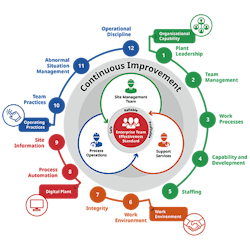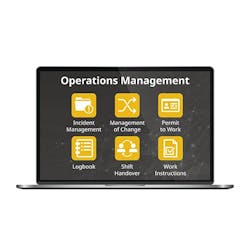Shift Team Digitalization Enhances Process Operations
Digitalization efforts at process plants can boost efficiency and profitability. Based on our experience, shift handover and routine follow-up of high-priority tasks are prime areas for efficiency improvements from digitalization. That’s certainly what Formosa Petrochemicals Corporation (FPCC), Mailiao Township, Taiwan, has found.
The company operates a 500,000-bbl/d of refining and petrochemicals complex in Mailiao Township. It employs more than 5,000 people at the three production plants there. Founded in 1992, its work processes have developed and adapted to different cultures particular to individual shifts. FPPC management, in its quest for operational excellence, reckoned that improving of shift team effectiveness could enhance the company’s performance.
Through a seminar facilitated by a joint KBC and Yokogawa team, FPCC saw that the execution of its production and maintenance plan was sub-optimal. Internal investigations and information gathering showed that its shift execution approach had not grown in line with best practices and digitalization tools.
This was especially evident in shift handovers. These suffered from data and communication gaps — including incomplete information; missed or unknown work item status; illegible handwritten log sheets; and data limited to operators’ written notes, hindering further analysis and troubleshooting.
The company also found that certain shifts had more efficient handovers. Because of this inconsistency, FPCC realized that a change-management program would be another important aspect of a successful implementation of digital tools to support the shift- and plant-team improvements.
FPCC’s vision is to continuously adopt best operating practices and implement these across its site. The company chose KBC’s Shift Team Effectiveness Standard because it consists of 14 discrete elements built on best practice experience (Figure 1).
Figure 1. KBC’s standard includes 14 discrete elements that take into account best practices.
As a non-prescriptive standard based on KBC’s extensive industry experience and the benchmarking of process industry best practices, the standard offers flexibility. FPPC plant leadership and the project team were able to adapt these best practices to suit their needs, resulting in superior plant shift-team performance.
FPCC’s drive toward using the latest digital technologies led them to implement the Logbook and Shift Handover modules from the Yokogawa RPO Operations Management Suite (Figure 2). That integrated suite provides the shift team as well as area- and plant-wide teams with digital tools that help streamline safety and shift-team management practices.
Project Implementation
FPCC’s management recognized that its vision to improve safety and the performance of shift teams would require a multi-phase, multi-year program. It decided to execute the project over two distinct phases.
Phase One. FPCC selected a particular process plant area to initiate the project. This would allow for ease of assessment as well as implementation. The project team could monitor and adjust the results before rolling out the tools more widely. This phase ran from January to October 2018.
A combined KBC/Yokogawa team assessed current shift operations’ practices against KBC’s Shift Team Effectiveness Standard. The team focused on Element 11 — Shift Team Practices, and Element 4 — Capability and Development.
Figure 2. Shift teams initially took advantage of the Logbook and Shift Handover modules.
The project team includes internal change management agents selected by plant management. These people have the necessary authority to drive behavior change as well as an intimate knowledge of plant personnel and operations. Their participation contributed significantly to project success. They continue to take part in all project meetings and activities.
The result of this approach was the development of a close working relationship with project stakeholders. They were on board with the new shift-team working approach.
The site assessment took the form of a series of one-on-one interviews, field observations, and workflow discovery sessions with the shift teams and shift and plant management. The workflow discovery sessions involved the FPCC operations team mapping out its current shift-handover and daily shift-management activities on a wall. In addition, the team had to support each of the posted activities with evidence of actual documents or reports to demonstrate compliance with the activity.
The wall map helped the FPCC change agents, operations team and the KBC/Yokogawa team visualize the shift team’s daily activities. More importantly, it enabled identifying areas of excellence as well as areas needing improvements.
The project team, including the change agents, indicated where they thought improvements or adjustments were possible. Once FPCC management approved the proposals, the working relationship with the change agents helped get support for the project approach and delivery methodology.
The project team installed and implemented the Logbook and Shift Handover modules from Yokogawa’s Operations Management Suite. This customizable software allowed the project team, in collaboration with FPCC, to design the shift log layout and set content requirements. These closely align with the shift workflow, which guides the shift teams in optimizing their shift structure and ensures their execution of the production and maintenance plan.
The KBC/Yokogawa team worked closely with the FPCC change agents, shift teams, and shift and plant management to understand their specific shift operations’ challenges and to develop a practical workflow. The change agents conducted a series of training sessions on implementing structured shift-handover protocols.
The project team recognized that automating part of the workflow was possible. This would further advance FPCC’s goal of digitalizing its assets. So, the team installed and implemented Yokogawa’s procedure automation tool (ExaPilot) on one specific process.
Phase Two. In this phase, which started in June 2019 and is ongoing,
the project team supported FPCC with the installation and implementation of the Work Instruction module of the Operations Management Suite. It links with the Logbook and Shift Handover tools that the team implemented in Phase One. The combination of these three modules provides shift management with a versatile and holistic shift- and plant-team communication tool.
The Logbook, Shift Handover, and Work Instruction tools went over so well that FPCC is increasing their use across the site. To further support the FPCC team, KBC/Yokogawa further customized the tools so they now are accessible via a smartphone.
Compelling Results
FPCC management is happy with the results of the phased program. The company now benefits from:
• a structured shift log and handover template for complete information; (FPCC expects to see up to a 90% improvement in shift-handover completeness after the program ends.)
• process-specific related information that supports data analysis and eases troubleshooting;
• much better task tracking that reduces outstanding work items; (KBC’s client group reports a greater-than-95% improvement in the follow-up on high-priority work instructions.)
• legible log sheets (compared to handwritten ones) that deliver a 90% improvement in the capture of shift log information; and
• supporting information that now includes pictures and documents, which directly upload to the workflow.
The implementation of digital shift-management tools and best practices, coupled with the change-management program, has provided the management team with a sustainable improvement in shift-team effectiveness. The KBC/Yokogawa project team and the change agents continue to deliver this multi-year program along with the benefits of digitalization.
DAVE LOUBSER is a London-based senior staff consultant for KBC, a Yokogawa Company. Email him at [email protected]


